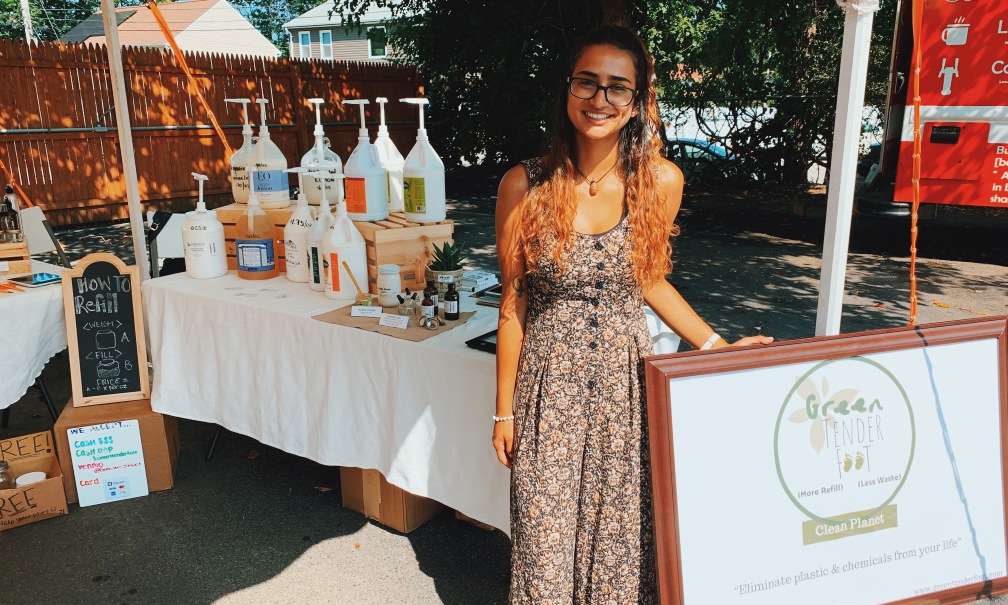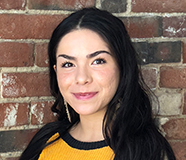In the beginning of March we sat down with SEG Incubator graduate Ana Duque of the zero-waste pop-up shop Green Tenderfoot. A native of Pawtucket, Ana was a vendor at SEG’s 2019 Buy with Heart Marketplace and continues to show up for the community by helping consumers shop cleaner. When COVID-19 hit, Ana mobilized her services and reached out to customers in new ways.
Serena Manna: You’ve done a lot to open up access to the zero-waste movement in Rhode Island. Tell us about your mission.
Ana Duque: The mission of Green Tenderfoot is to include everyone – regardless of class, race, gender and economic status – in the low-waste movement. By having a zero-waste refill station, we’re providing package-free, everyday items such as bath, body and cleaning products so we can reduce our waste together. Not only do we want to inspire others but we want to show companies that we demand ethical and eco-friendly products that are package free.
“By providing a refill station, I can share with the community ways to take care of our bodies and take care of the earth.”
SM: Where did you begin?
AD: I was working at City Year as a teacher assistant in Los Angeles in 2016 when I first learned about environmental racism, which is when I started living zero-waste. I constantly researched online about zero-waste, learning about the chemicals in conventional products and educating others about harmful ingredients and packaging. To hold myself accountable for the changes I was making as a consumer, I created a zero-waste blog named Green Tenderfoot.
SM: Why did you decide to start your refill station in Rhode Island?
AD: In California I could bulk shop for everything, and buying in bulk was cheaper. When I moved back to Rhode Island, I discovered that this type of shopping wasn’t very accessible here, and I wanted to create it. I am originally from Pawtucket and wanted the people I grew up with to have access to these resources. By providing a refill station, I can share with the community ways to take care of our bodies and take care of the earth. Plus, it’s less expensive. I always tell people that when they go to a store to buy, they’re paying extra for the bottle, which is typically plastic.
SM: What kind of response have you seen from customers?
AD: The people I target are the people who aren’t aware they can do something. They’re typically not googling how to be zero waste. For many of them, this is the first time they are asking about the ingredients in their products. I never imagined I’d be teaching others about something like deodorant.
SM: You curate the products you sell. What’s it like to work directly with suppliers?
AD: A lot of the suppliers are small businesses and co-ops that really make you feel like you’re doing business with the right people. If I have questions I can call them right up. Our communication is very friendly and interactive – you’re not talking to a machine. The challenge has been finding enough small businesses who provide things in bulk. I try to source as locally as possible, but with the demand not there yet, I have to search for larger co-ops outside the state. I’m hoping to be able to make my own products in the future.
“The people at SEG and the social entrepreneurs who were in my cohort really helped me open my mind to different ideas and possibilities. I also learned just how complicated business really is.”
SM: How do your services work?
AD: Before the COVID-19 pandemic, we had a refill station available at popups in various locations. We are now providing delivery and pickup within a 10-mile radius. Our delivery service includes any of our refill products or items on our website, and it is completely free. If you choose to use your own containers, you leave your containers outside of your house and we refill them and place them where they were found. On top of delivering our products, we are also offering delivery aid for folks who may be immunocompromised or are at risk of contracting the virus. This can include picking up groceries or medication and having it dropped off at their home. Our refill station at 881 Main Street in Pawtucket remains open for customers by appointment. I feel very humble and lucky to be able to continue to receive support from customers, so for the next three weeks we are donating 20% of our sales to a local organization called The Elisha Project, which collects food to donate to families in need.
SM: How did participating in SEG’s Incubator in 2019 help you develop Green Tenderfoot?
AD: One of my favorite parts about the Incubator was being able to hear everyone’s ideas about my idea. Other people thought of things that I never did. I was able to imagine different ways I could grow beyond the refill stations. The people at SEG and the social entrepreneurs who were in my cohort really helped me open my mind to different ideas and possibilities. I also learned just how complicated business really is. Learning about social impact and creating a business is a lot to do on your own, and it’s great to have resources and people who can help you.
SM: What was the most important thing you learned?
AD: Just the concept of social enterprise itself. I’ve always loved volunteering and giving back. People always have the idea that business owners are greedy. But this way you can both give back and be an entrepreneur.
SM: Who have been your main partners in the community so far?
AD: I got involved with Zero Waste Providence the moment I got back to Rhode Island. I am also collaborating with Vegan Viridity, Impact Everything, Enjoyful Foods, and Mindful Maia.
SM: What are your future plans for Green Tenderfoot?
AD: My vision shifts every day. I want to be able to incorporate different components into Green Tenderfoot. For example, I’d like to create a process where people can have their order ready for pick up and to go. We want to make it as convenient as possible while also getting people into a different routine of how they purchase their products. I’m excited that I’ve now secured a space for my refill station so people can find me easier.
SM: Do you have any advice for an entrepreneur just starting out?
AD: Go for it! A lot of people just sit on ideas, needing to perfect it before starting. I heard this concept: when you don’t make your ideas a reality, they bounce off of you into someone else, and someone else makes it a reality.
By Serena Manna
SEG Communications Coordinator


